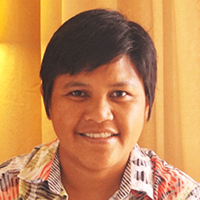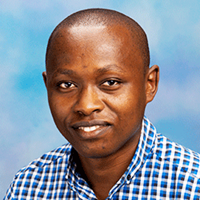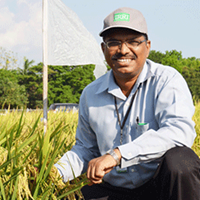Episode 32: Global Food System Challenge Grand Prize Winners
Join us to celebrate the Global Food System Challenge Grand Prize Winners. Representatives from the International Rice Research Institute, Solar Freeze, and WorldFish discuss their work and the role that the generous funding from Seeding The Future Foundation plays in helping to make healthier diets more accessible and empowers consumers to make choices benefitting both personal and planetary health.
 Quennie Vi Rizaldo, Masters in Public Health, University of Roehampton, London, UK. Quennie is a Human Nutrition Specialist from the Philippines, has worked in health and nutrition projects for over 15 years in the Philippines, Cambodia, and Kenya. In Myanmar, she focuses on using fish and other aquatic foods to support adoption of healthy and sustainable diets across the country, as well as finding solutions to address the barriers in consuming nutrient rich fish among vulnerable groups.
Quennie Vi Rizaldo, Masters in Public Health, University of Roehampton, London, UK. Quennie is a Human Nutrition Specialist from the Philippines, has worked in health and nutrition projects for over 15 years in the Philippines, Cambodia, and Kenya. In Myanmar, she focuses on using fish and other aquatic foods to support adoption of healthy and sustainable diets across the country, as well as finding solutions to address the barriers in consuming nutrient rich fish among vulnerable groups.
 Dysmus Kisilu, is the founder of Solar Freeze, a company that specializes in providing renewable energy solutions (solar powered cold storage units) to off-grid communities in Kenya used for the storage of vaccines, medicines and temperature sensitive agricultural products. To date Solar Freeze has served over 3,000 people in Kenya to effectively store vaccines and medicines and to increase agricultural yields by more than 150 per cent from 2016 to date.
Dysmus Kisilu, is the founder of Solar Freeze, a company that specializes in providing renewable energy solutions (solar powered cold storage units) to off-grid communities in Kenya used for the storage of vaccines, medicines and temperature sensitive agricultural products. To date Solar Freeze has served over 3,000 people in Kenya to effectively store vaccines and medicines and to increase agricultural yields by more than 150 per cent from 2016 to date.
Dysmus is also the founder of “Each one, teach one- Train and Earn” an initiative within Solar Freeze that aims to impact the next generation of renewable energy for agriculture leaders in Africa by mentoring young people aged 18-29 years in the operation, maintenance and repair of renewable energy solutions specifically for agriculture, as a result, this skills transfer program has enabled 100 young people learn and earn an income.
 Jauhar Ali
Senior Scientist II,
Jauhar Ali
Senior Scientist II,
Hybrid Rice Breeding
Head,
Hybrid Rice Development Consortium
Leader, Hybrid Rice Technologies for Seed Industry Unit, Rice Breeding Innovation Platform, International Rice Research Institute (IRRI), Los Banos 4031, Laguna, Philippines. [email protected], http://www.irri.org
Jauhar is a dynamic and highly accomplished research leader with 28 years of research experience who has contributed significantly to the development of and capacity-building for global agricultural research. He has been a demonstrative and successful breeder who directly bred and released 64 rice inbred and 22 hybrid rice varieties and deployed them over 3.5 mha across Asia and Africa. He successfully revitalized the hybrid rice development consortium (HRDC), a platform with +95 public and private seed companies by bringing more value to their membership, increasing paid membership by 52% over 2016.
Jauhar possesses a broad knowledge base in agriculture, crop breeding, genetics, molecular breeding, molecular biology, and genomics, evident from his 100+ publications and subject matter expertise. He employs genomic selection tools under the OneRice Breeding strategy for parental improvement within a given heterotic pool and applies genomic prediction of heterosis. He connects genomic resources and tools to breed superior, high-yielding, multiple-stress–tolerant rice varieties and hybrids. He developed and targeted the improved rice materials through systematic testing, adaptive trials, and varietal release for eight countries in Asia and five in Eastern and Southern Africa.
He has been a highly innovative and passionate research leader who took up early research initiatives in technologies that could impact farmer livelihoods, especially on green super rice breeding, two-line hybrid rice, nutrient-use efficient hybrids, direct-seeded rice hybrids, arsenic-safe rice, and climate-smart rice varieties. The arsenic-safe rice varieties project recently won the Global Food Systems Grand Challenge Award 2021.
Jauhar has successfully raised nearly 33.3 million USD through his research projects. The prominent ones are ‘Green Super Rice for resource-poor farmers of Asia and Africa,’ ‘Hybrid Rice Technology for Nepal,’ and ‘Two-Line Study Group.’ He has been a successful research collaborator and well networked, ready to undertake new challenges and make adverse situations into opportunities for the benefit of resource-poor farmers and stakeholders.
He has taught, trained, and mentored over +300 undergrad agricultural degree students in crop breeding, genetics, and biotechnology. Jauhar contributed immensely to the capacity building of researchers and directly trained more than 3000 researchers through guiding 18 Masters and 20 Ph.D. students (with 50% females) who believe in empowering them. He mentored and trained 26 Visiting Research Fellows & Scientists (7), On-the-Job Trainees (14), and Interns (5).
Jauhar has successfully raised nearly 33.3 million USD through his research projects. The prominent ones are ‘Green Super Rice for resource-poor farmers of Asia and Africa,’ ‘Hybrid Rice Technology for Nepal,’ and ‘Two-Line Study Group.’ He has been a successful research collaborator and well networked, ready to undertake new challenges and make adverse situations into opportunities for the benefit of resource-poor farmers and stakeholders.
He has taught, trained, and mentored over +300 undergrad agricultural degree students in crop breeding, genetics, and biotechnology. Jauhar contributed immensely to the capacity building of researchers and directly trained more than 3000 researchers through guiding 18 Masters and 20 Ph.D. students (with 50% females) who believe in empowering them. He mentored and trained 26 Visiting Research Fellows & Scientists (7), On-the-Job Trainees (14), and Interns (5).
Jauhar finished his BS degree in Agriculture (honors) from Punjab Agricultural University, Ludhiana, India, in 1988. Later, he took up his Masters (1990) and Doctoral (1993) degrees in the field of genetics from India’s premier Indian Agricultural Research Institute (IARI), New Delhi. He did his post-doctoral fellowship at the International Rice Research Institute (IRRI), on two occasions, one in 1994-1995 and later between 2000-2003. He has been serving IRRI from 2009 onwards as Globally Recruited Scientist (GRS). He is currently the Leader of the Hybrid Rice Technologies for Seed Industry (HRTSI) Unit and Head of the Hybrid Rice Development Consortium (HRDC) at IRRI.
Host
 Matt Teegarden, PhD is a food chemist and science communicator, with experience in both industry and academia. Matt is currently the Senior Researcher in the Foods for Health initiative at Ohio State, where he is largely responsible for the development and advancement of scientific operations and communications. Outside of work and IFT involvement, Matt enjoys baking and participating in LGBTQ+ recreational sports leagues around Columbus.
Matt Teegarden, PhD is a food chemist and science communicator, with experience in both industry and academia. Matt is currently the Senior Researcher in the Foods for Health initiative at Ohio State, where he is largely responsible for the development and advancement of scientific operations and communications. Outside of work and IFT involvement, Matt enjoys baking and participating in LGBTQ+ recreational sports leagues around Columbus.
Latest News

Grasping the Transformative Power of AI
An artificial intelligence expert outlines why AI literacy is critical to the future of food.

Future Food-Tech 2024 Tackles Transformation, Underscores Collaboration
Mission-driven Future Food-Tech exhibitors and conference presenters showcased innovative, transformative ingredients and technologies and emphasized the importance of collaboration in addressing food system challenges.

Can Food Science and Technology Transform the Food System?
IFT President Sean Leighton reflects on the value of collaboration within the science of food discipline and highlights the value IFT FIRST will offer in this area.

Mapping Food System Innovation
Here’s a look at six clusters of cutting-edge entrepreneurship around the globe.

The State of Sensory Science
Three seasoned sensory scientists share their thoughts on the complexity of measuring consumer perceptions, the value of academic/industry collaboration, the evolution of the discipline, and why they love what they do.
